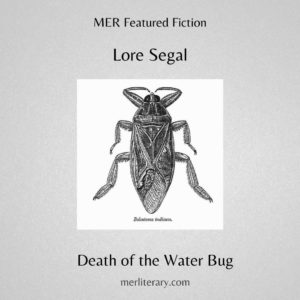MER Featured Fiction
Death of the Water Bug
by Lore Segal
Lucinella wrote to Bridget: ‘We never outlive a shy, uncomfortable shame before asking a friend, especially another writer, to give us the time and attention to read what we have written. ‘Death of a Water Bug’ was accepted by a journal, had me write my ‘no more than fifty-word bio’ but never explained why they did not publish the story. Please, please believe that I am asking for your shamelessly honest opinion.’
Bridget replied, ‘I do. I completely believe that we believe that we want our reader’s honest opinion, but you and I both know that there’s not one of us who does not conceal from herself the hope, the expectation, that the honest opinion will be that we have written a masterpiece.
Incidentally, I hate bugs.
Lucinella’s Story
I called Eddy, our handyman, and he came up, got rid of the water bug and closed the hole behind the stove by which, he thought, the creature must have got into my kitchen.
One Week Later, as they say in the movies, Bessie was in town and came over and went to get herself a glass of water. Her scream would, in an audition for a Miss Marple episode, have landed her the character who trips over the corpse. Another water bug! Bessie grabbed her handbag and was out the front door.
“Oh come on! Come back.” I had followed her into the hallway. “Bessie! I’ll get rid of him! Come back inside and have a drink.”
“I hate it!” Bessie said, visibly shuddering, and escaped into the elevator.
Getting rid of the water bug turned out not to be so simple. The animal sat on the kitchen floor. I couldn’t keep calling Eddy, so I prepared myself for that crunching sound, raised my right leg and brought my shoe down where the bug was no longer sitting.
It put me in mind of a Robert Frost poem in which the poet’s pencil point fails to eliminate the spot on the paper before him because the spot has run away and continues running with such frantic intentionality, the poet comments that it’s not on every page one has the good fortune to meet with such an active intelligence.
The water bug had chosen not to be stepped on. His abhorrence of being dead gave his six legs a surely admirable burst of speed into the black region under the sink where he knew–yes, the animal knew that I was not able to get at him.
The next time Bessie was in town, I invited her to watch the exquisite French film called ‘Microcosmos’ which says that it is about ‘the people of the grass.’
“Bugs!” Bessie said, but she sat down and we watched two lady bugs on a stalk that bends under their combined weight while they share a drink from opposite sides of the same dew drop.
“Ladybugs are okay,” Bessie said.
“My favorite is the dung beetle,” I said.
“HATE it!” Bessie said and reached for her handbag.
I said, “Bessie, watch!”
The beetle is transporting its ball of dung from somewhere to somewhere else by walking on its front legs, using the superior strength of the two back legs with the assistance of the middle pair to do the pushing. I don’t know if it’s because it is walking backwards, or because of all that nervous urgency, it takes the animal a moment to know that the dungball has got hoisted onto the point of an up-standing little twig. Now what? What, if it is not the operation of thinking, stops the beetle from pushing at the side, which is not working and starts it pushing from the bottom up to dislodge the dung from what it was stuck on?
“Yuck!” Bessie said.
“Watch!” I said. Here’s where the camera backs away and up to a height that gives an overview of the terrain across which the animal needs (oh, reason not the need) to transport its dung it alone knows where. Bessie got up.
“Bessie, stay, please. Sit. I want to argue. “
Bessie sat reluctantly down.
“Why is it,” I asked her, “that you, a five-foot nine-inch human cannot–and I totally believe that you can really not be in a room–would rather not be in the same apartment as an animal that stands less than an inch off the ground, who runs away and hides under the sink because he has no apparatus with which to do you the least harm?”
Bessie said, “Imagine that bug walking over your bed, no! crawling up the leg of your pants…”
“It’s true,” I said, “that I can’t think of the water bug as a she. But have you seen him rub his head between his two antennae? Don’t you love the housefly when it does that thing like washing its hands?”
Bessie said that she did not care to think about bugs doing cute people-things. ”Insects,“ she said, “are the non-human, the not-us. Insects are our Other.”
“The other,” I said, “whom we are meant to learn, if not to like, to at least love, because they perfectly resemble us, in not wanting to be stepped on, not to be squashed underfoot, who want so immensely to not be dead.”
Bessie said, “When God decreed enmity between the human and the snake he included the creepy crawlies with their six legs, their sectioned bodies that have the plumbing on the outside, and no fur or feather with which to cover themselves.”
I said, “Okay! If we’re playing Bible, I see your Genesis and raise you a Pharaoh. ‘Swarming!’ is the verb for the infestation of Hebrews in Goshen.”
“So where are you going with this?”
“Isn’t it interesting that both Pharaoh and Hitler wanted to be rid of us and that both put every roadblock in our way to stop us from leaving?”
Bessie continued in the expressive pose of one waiting for further explanation or enlightenment.
“Well anyway,” I argued, “Jaques says that we are the usurpers, who ‘fright the animals and kill them up in their assigned and native dwelling place.”
“In the Forest of Arden!“ cried Bessie. “You’re not going to claim that the house-fly, the pantry moth, and the cockroach have rights in the New York kitchen?”
“From their viewpoint, they have. In my student days, I shared my room with a little velvet mouse. In the stillness of midnight it made a surprising racket inside the waste paper basket and left little poops behind my illicit hotplate. When I put the light on it was sitting between two broken parquet tiles. It pointed its little face this way, that way, this way.”
“And what will you do when you have your next infestation of cockroaches?” Bessy asked me.
“Call Eddy,” I said, “and Eddy will call the exterminator.”
Bessie said she HATED cockroaches, got her hand bag and left, left me wondering if it isn’t morally cleaner to do good to your friends and harm your enemies, and if that included the animals who merely annoy or disgust us.
The water bug is back. How many days has it been? No running now. I watch him slouch out from behind the sink, his head low to the ground, limping sideways as if his feet hurt. In the end of Kafka’s story, the house maid’s broom sweeps the dead bug out the kitchen door. Nothing easier than for me to bring my shoe down on a senescent water bug. I wipe up his remains with the corner of a paper towel and drop it in the garbage, a minor sample of the world’s sadness.
Bridget wrote Lucinella, “Wonderful that our idea is never new under the sun. Shakespeare said it in a single sentence:
And the poor beetle, that we tread upon,
In corporal sufferance finds a pang as great
As when a giant dies.“
Lore Segal is the author of Her First American. Her most recent fiction is Ladies’ Lunch and Other Stories. She was born ninety-five years ago in Vienna and lives in New York.

 LORE SEGAL is the author of the Pulitzer Prize finalist Shakespeare’s Kitchen, as well as the novels Half the Kingdom, Lucinella, Other People’s Houses and Her First American. Her latest collection of stories Ladies Lunch and other stories (Melville House) is out this month; some of the characters in “Death of the Water Bug” are also in those stories. She is the recipient of the American Academy and the Institutes of Arts and Letters Award, a Guggenheim Fellowship, The O’Henry Prize and the Harold U. Ribalow Prize. She has written for The New Yorker, The New York Times, Harper’s Magazine, The New Republic, and numerous other publications. In 2022, Segal was inducted into the American Academy of Arts and Science. She has also written children’s books and translates from the German. Segal lives and works in New York City.
LORE SEGAL is the author of the Pulitzer Prize finalist Shakespeare’s Kitchen, as well as the novels Half the Kingdom, Lucinella, Other People’s Houses and Her First American. Her latest collection of stories Ladies Lunch and other stories (Melville House) is out this month; some of the characters in “Death of the Water Bug” are also in those stories. She is the recipient of the American Academy and the Institutes of Arts and Letters Award, a Guggenheim Fellowship, The O’Henry Prize and the Harold U. Ribalow Prize. She has written for The New Yorker, The New York Times, Harper’s Magazine, The New Republic, and numerous other publications. In 2022, Segal was inducted into the American Academy of Arts and Science. She has also written children’s books and translates from the German. Segal lives and works in New York City.
